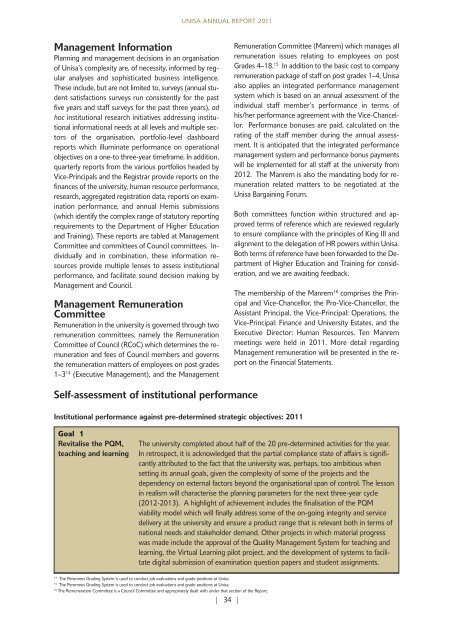Download the Annual report 2011 - Unisa
Download the Annual report 2011 - Unisa
Download the Annual report 2011 - Unisa
You also want an ePaper? Increase the reach of your titles
YUMPU automatically turns print PDFs into web optimized ePapers that Google loves.
Management Information<br />
Planning and management decisions in an organisation<br />
of <strong>Unisa</strong>’s complexity are, of necessity, informed by regular<br />
analyses and sophisticated business intelligence.<br />
These include, but are not limited to, surveys (annual student<br />
satisfactions surveys run consistently for <strong>the</strong> past<br />
five years and staff surveys for <strong>the</strong> past three years), ad<br />
hoc institutional research initiatives addressing institutional<br />
informational needs at all levels and multiple sectors<br />
of <strong>the</strong> organisation, portfolio-level dashboard<br />
<strong>report</strong>s which illuminate performance on operational<br />
objectives on a one-to three-year timeframe. In addition,<br />
quarterly <strong>report</strong>s from <strong>the</strong> various portfolios headed by<br />
Vice-Principals and <strong>the</strong> Registrar provide <strong>report</strong>s on <strong>the</strong><br />
finances of <strong>the</strong> university, human resource performance,<br />
research, aggregated registration data, <strong>report</strong>s on examination<br />
performance, and annual Hemis submissions<br />
(which identify <strong>the</strong> complex range of statutory <strong>report</strong>ing<br />
requirements to <strong>the</strong> Department of Higher Education<br />
and Training). These <strong>report</strong>s are tabled at Management<br />
Committee and committees of Council committees. Individually<br />
and in combination, <strong>the</strong>se information resources<br />
provide multiple lenses to assess institutional<br />
performance, and facilitate sound decision making by<br />
Management and Council.<br />
Management Remuneration<br />
Committee<br />
Remuneration in <strong>the</strong> university is governed through two<br />
remuneration committees, namely <strong>the</strong> Remuneration<br />
Committee of Council (RCoC) which determines <strong>the</strong> remuneration<br />
and fees of Council members and governs<br />
<strong>the</strong> remuneration matters of employees on post grades<br />
1–3 14 (Executive Management), and <strong>the</strong> Management<br />
UNISA ANNUAL REPORT <strong>2011</strong><br />
Self-assessment of institutional performance<br />
Institutional performance against pre-determined strategic objectives: <strong>2011</strong><br />
14 The Peromnes Grading System is used to conduct job evaluations and grade positions at <strong>Unisa</strong>.<br />
15 The Peromnes Grading System is used to conduct job evaluations and grade positions at <strong>Unisa</strong>.<br />
16 The Remuneration Committee is a Council Committee and appropriately dealt with under that section of <strong>the</strong> Report.<br />
| 34 |<br />
Remuneration Committee (Manrem) which manages all<br />
remuneration issues relating to employees on post<br />
Grades 4–18. 15 In addition to <strong>the</strong> basic cost to company<br />
remuneration package of staff on post grades 1–4, <strong>Unisa</strong><br />
also applies an integrated performance management<br />
system which is based on an annual assessment of <strong>the</strong><br />
individual staff member’s performance in terms of<br />
his/her performance agreement with <strong>the</strong> Vice-Chancellor.<br />
Performance bonuses are paid, calculated on <strong>the</strong><br />
rating of <strong>the</strong> staff member during <strong>the</strong> annual assessment.<br />
It is anticipated that <strong>the</strong> integrated performance<br />
management system and performance bonus payments<br />
will be implemented for all staff at <strong>the</strong> university from<br />
2012. The Manrem is also <strong>the</strong> mandating body for remuneration<br />
related matters to be negotiated at <strong>the</strong><br />
<strong>Unisa</strong> Bargaining Forum.<br />
Both committees function within structured and approved<br />
terms of reference which are reviewed regularly<br />
to ensure compliance with <strong>the</strong> principles of King III and<br />
alignment to <strong>the</strong> delegation of HR powers within <strong>Unisa</strong>.<br />
Both terms of reference have been forwarded to <strong>the</strong> Department<br />
of Higher Education and Training for consideration,<br />
and we are awaiting feedback.<br />
The membership of <strong>the</strong> Manrem 16 comprises <strong>the</strong> Principal<br />
and Vice-Chancellor, <strong>the</strong> Pro-Vice-Chancellor, <strong>the</strong><br />
Assistant Principal, <strong>the</strong> Vice-Principal: Operations, <strong>the</strong><br />
Vice-Principal: Finance and University Estates, and <strong>the</strong><br />
Executive Director: Human Resources. Ten Manrem<br />
meetings were held in <strong>2011</strong>. More detail regarding<br />
Management remuneration will be presented in <strong>the</strong> <strong>report</strong><br />
on <strong>the</strong> Financial Statements.<br />
Goal 1<br />
Revitalise <strong>the</strong> PQM, The university completed about half of <strong>the</strong> 20 pre-determined activities for <strong>the</strong> year.<br />
teaching and learning In retrospect, it is acknowledged that <strong>the</strong> partial compliance state of affairs is significantly<br />
attributed to <strong>the</strong> fact that <strong>the</strong> university was, perhaps, too ambitious when<br />
setting its annual goals, given <strong>the</strong> complexity of some of <strong>the</strong> projects and <strong>the</strong><br />
dependency on external factors beyond <strong>the</strong> organisational span of control. The lesson<br />
in realism will characterise <strong>the</strong> planning parameters for <strong>the</strong> next three-year cycle<br />
(2012-2013). A highlight of achievement includes <strong>the</strong> finalisation of <strong>the</strong> PQM<br />
viability model which will finally address some of <strong>the</strong> on-going integrity and service<br />
delivery at <strong>the</strong> university and ensure a product range that is relevant both in terms of<br />
national needs and stakeholder demand. O<strong>the</strong>r projects in which material progress<br />
was made include <strong>the</strong> approval of <strong>the</strong> Quality Management System for teaching and<br />
learning, <strong>the</strong> Virtual Learning pilot project, and <strong>the</strong> development of systems to facilitate<br />
digital submission of examination question papers and student assignments.

















